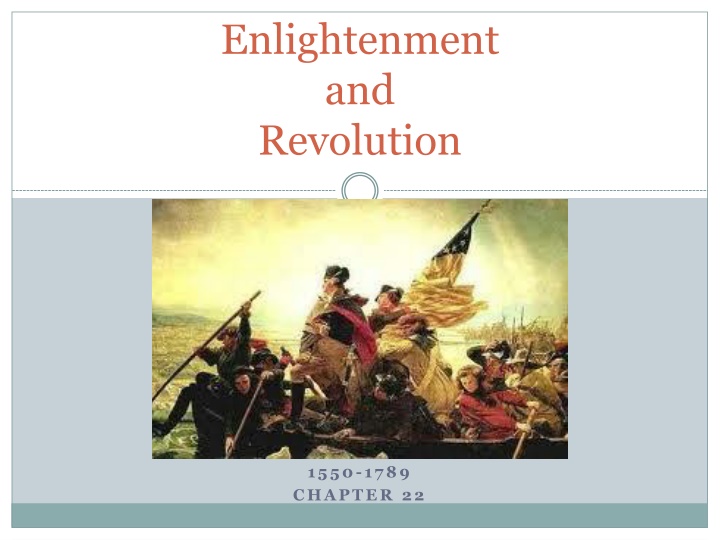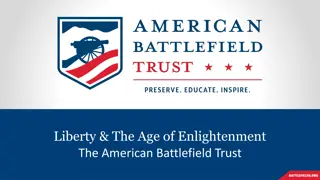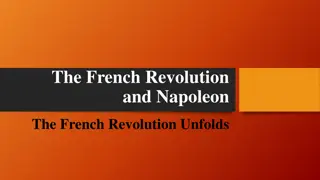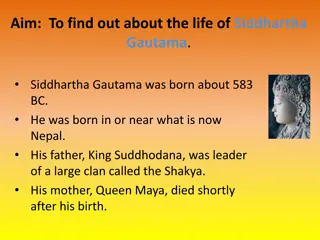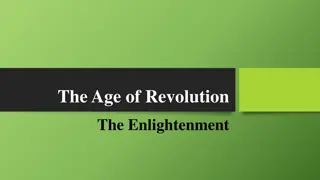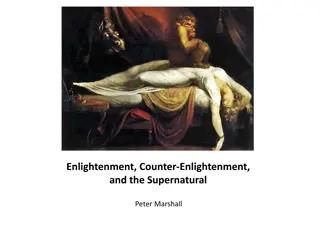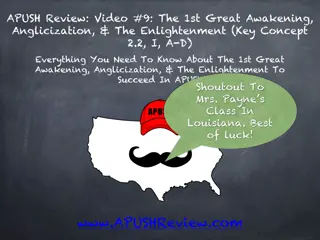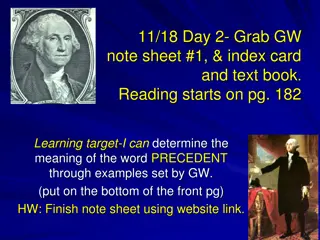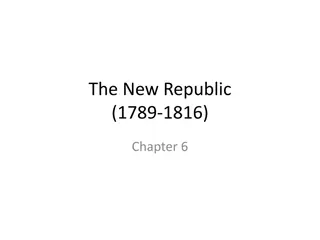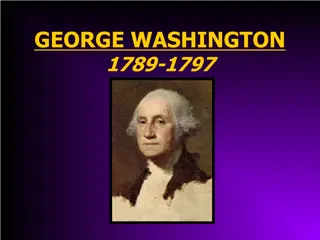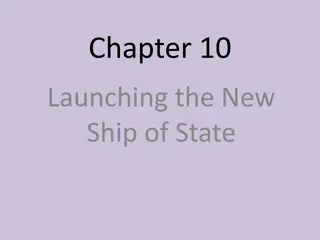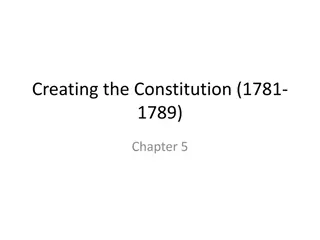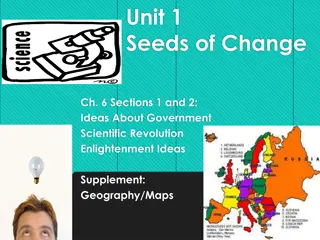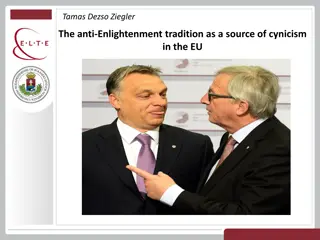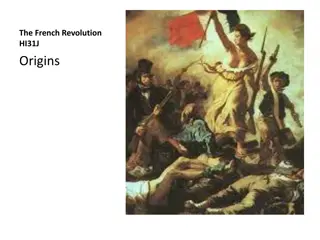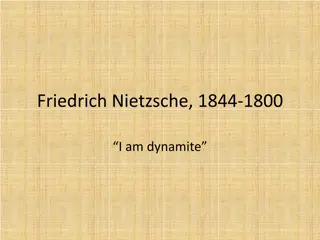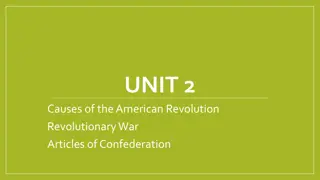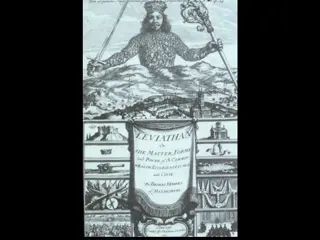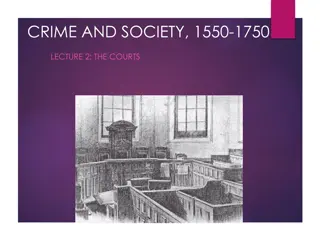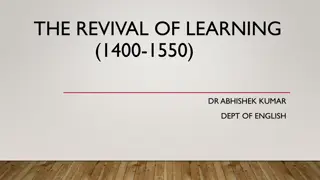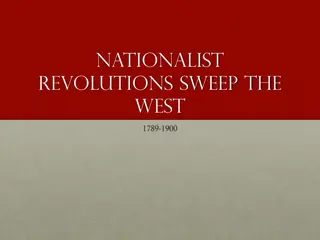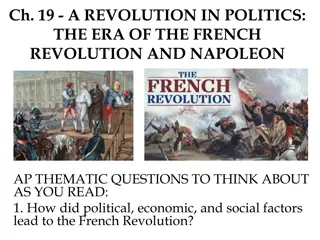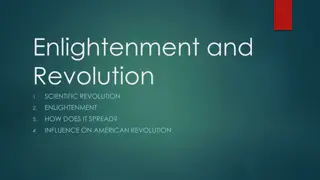Enlightenment and Revolution 1550-1789 Chapter 22 Overview
This chapter provides a comprehensive overview of the Enlightenment and Revolution era between 1550-1789. It covers key concepts including the Scientific Revolution, Enlightenment thinkers such as Galileo Galilei, Isaac Newton, John Locke, Voltaire, and more. The vocabulary section introduces terms like Geocentric Theory, Heliocentric Theory, Social Contract, Salon, and Enlightened Despot. The chapter also delves into the roots of modern science and the revolutionary model of the universe proposed by Nicolaus Copernicus and Johannes Kepler.
Download Presentation

Please find below an Image/Link to download the presentation.
The content on the website is provided AS IS for your information and personal use only. It may not be sold, licensed, or shared on other websites without obtaining consent from the author.If you encounter any issues during the download, it is possible that the publisher has removed the file from their server.
You are allowed to download the files provided on this website for personal or commercial use, subject to the condition that they are used lawfully. All files are the property of their respective owners.
The content on the website is provided AS IS for your information and personal use only. It may not be sold, licensed, or shared on other websites without obtaining consent from the author.
E N D
Presentation Transcript
Enlightenment and Revolution 1550-1789 CHAPTER 22
Vocabulary I Geocentric Theory: Earth centered view of solar system (Aristotle) Scientific Revolution: New was of thinking about the natural world. Use science to answer questions (lightening) Scientific Method: Logical, step-by-step method of science. Foundation for all of modern research. Heliocentric Theory: Sun centered view of solar system (Copernicus) Galileo Galilei: Italian Astronomer. Findings went against the church. Isaac Newton: English, Law of Gravity, Laws of Motion
Vocabulary II Enlightenment: New intelligence movement that stressed reasons and thought to solve problems (figure it out) Social Contract: Thomas Hobbes agreement with people and government. Consent to rule, rule for the people. John Locke: Natural Rights; Everyone is born Free and Equal. (life, liberty and property). Overthrow gov. if these are not provided. Voltaire: French, tolerance, reasons, religious freedom, speech, I do not agree with a word you say, but I will defend to the death your right to say it
Vocabulary III Montesquieu: French, separation of powers, Power.. Should check power. Rousseau: French, Individual freedom, Man is born free .and everywhere he is in chains. Mary Wollstonecraft: Women s Rights, educated and useful (medicine/politics) Salon: Social gatherings for thinkers Enlightened Despot: Absolute ruler who accepted the Enlightenment ideas Catherine The Great: Russia, reformed Russia using the ideas from the Enlightenment era.
The Scientific Revolution CHAPTER 22:1
The Scientific Revolution The Roots of Modern Science New Way of Thinking Scientific Revolution Careful observation and questioning of accepted beliefs Discovery of new lands during exploration and printing press helped to spread new ideas The use of science to explain the unknown or the supernatural Scientifically explanation for everything in the Universe
A Revolutionary Model of the Universe The Heliocentric Theory Nicolaus Copernicus First to propose idea that sun was the center of the universe (1543) Johannes Kepler - Demonstrated using math that planets revolve elliptically around the sun
Galileo's Discoveries Discovered the law of universal acceleration Starry Messenger The Dialogue Concerning the Two Chief World Systems Built Europe s first telescope, advocated that the sun was the center of the universe Conflict With the Church Church leaders were afraid new theories might cause others to question church Forced Galileo to confess he thought Copernicus theory was wrong!
The Scientific Method The Scientific Method Using logic, reason, and experiments to reach conclusions Rene Descartes Everything should be doubted until proven by reason Sir Isaac Newton Explained the laws of gravity
The First True Research Scientists Rene Descartes I think therefore I am Sir Isaac Newton
Newton Explains the Law of Gravity All physical objects were affected equally by the same forces For every action there is an equal or greater reaction The Mathematical Principals of Natural Philosophy Universe was a giant clock and was expressed mathematically
The Scientific Revolution Spreads: Medicine and The Human Body New technology such as the microscope allowed humans to see bacteria for the first time Zacharias Janssen and Anton van Leeuwenhoek Discover bacteria Evangelista Torricelli (Italian) Invented the Barometer Gabriel Fahrenheit (German) Thermometer 32 Anders Celsius (Swede) Celsius based on 0
The Scientific Revolution Spreads: Medicine and The Human Body Andreas Vesalius (Dutch) On the Structure of the Human Body Detailed map of the body (organs/functions) Edward Jenner (English) Created world s first vaccine Helped to eliminate smallpox Robert Boyle (English) The Skeptical Chemist Boyle s Law: Matter was made up of smaller primary particles that joined together in different ways Volume, Temperature and Pressure of gas
Main Ideas Before the 1500 s who was the final authority with most unexplained events? 1. Why did this institution resist change? 1.
The Enlightenment In Europe CHAPTER 22:2
The Enlightenment In Europe: England John Locke Thomas Hobbes
Two Views On Government: Thomas Hobbes vs. John Locke Thomas Hobbes Book: The Leviathan Humans are natural selfish and wicked Governments needed to maintain order The Social Contract Escape bleak life by having a strong ruler In exchange for Law/Order Absolute Rulers, Absolute Monarchy
John Locke People could learn from experience/improve Self-Government All people are born free and equal Natural Rights Life, Liberty and Property Government must protect these rights Overthrow it!! Power of government comes from the CONSENT of people Book: Two Treatises of Government
Enlightenment Thinkers Voltaire 70 Books Attacked abuses of the government and church Advocated tolerance, reason, religious freedom and freedom of speech The pen is mightier than the sword
Enlightenment Thinkers Jean Jacques Rousseau Baron de Montesquieu Montesquieu and the Separation of Powers Believed that power must check power to prevent tyranny Thought up the theory of Checks and Balances Book: On the Spirit of Laws Rousseau: Champion of Freedom Man is born free but everywhere he is in chains Book: The Social Contract The only legitimate government was one freely formed by the people Thought Direct Democracy the best form of government
Enlightenment Thinkers' Cesare Bonesanna Beccaria Italian Laws existed to preserve social order, not to avenge crimes Abuses torturing of witnesses/suspects Speedy trial Punishments fits the crime Mary Wollstonecraft Limited rights for women A Vindication of the Rights of Women Education to become useful Women were important to society
Major Ideas of the Enlightenment Ideas Thinker Impact Natural Rights (Life, Liberty, Property) John Locke Fundamental to U.S. Declaration of Independence Separation of Powers Montesquieu France, U.S., Latin America nations use in new governments Freedom of thought and expression Voltaire U.S. Bill of Rights, French Dec. of Rights and Citizen, European monarchs reduce censorship Abolishment of Torture Beccaria U.S. Bill of Rights, torture outlawed/reduced in Europe/Americas Religious Freedom Voltaire Guaranteed in U.S. Bill of Rights, French Declaration of Rights of Man and Citizen, European Monarchs reduce persecution Women s Equality Wollstonecraft Women s rights groups from in Europe and North America
The Legacy of the Enlightenment Belief in Progress Human reason could solve social and medical problems Perfect society was possible 2. A More Secular Outlook People began to question the beliefs and teachings of the church Promoted religious tolerance 3. Importance of the Individual People began to look inward for guidance instead of to the Church or monarchs 4. Causes Revolutions American, French, South American, Etc. 1. 1. 2. 1. 2. 1. 1.
The Enlightenment Spreads Frederick The Great Catherine The Great Joseph II CHAPTER 22:3
The Enlightenment Spreads 1700s Paris, France is the cultural/intellectual capital Enlightenment Ideas are discussed Salons Social gatherings/spreading of Enlightenment ideals First Encyclopedias are developed Thirst for knowledge
The Enlightenment Spreads Changes in Music Lighter more elegant music Birth of Classical Music Vienna, Austria Wolfgang Amadeus Mozart Ludwig van Beethoven
Enlightened Musicians Beethoven Mozart
Enlightened Monarchs Enlighten Despots Supported new enlightenment ideas Didn t want to loose any power!! Stronger Countries/Rule More Effectively
Enlightened Despots Catherine The Great of Russia Fredrick The Great of Prussia
Enlightened Despots Catherine The Great of Russia Fredrick The Great of Prussia Promoted religious tolerance and abolished torture The job of a ruler was to serve the state and the people The First Servant of The State Limited the rights of Serfs to maintain power Put in limited reforms for religious toleration Expanded Russia west into Poland and south to the Black Sea
